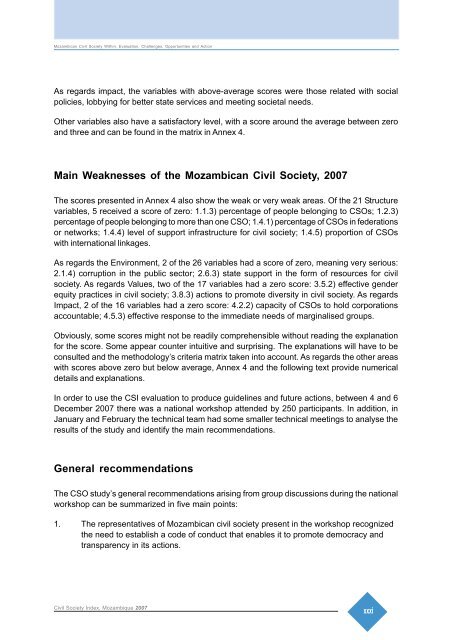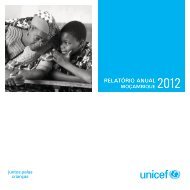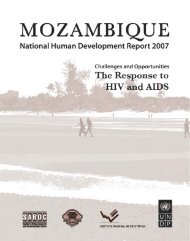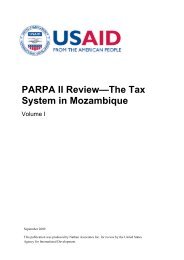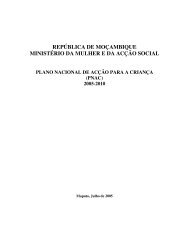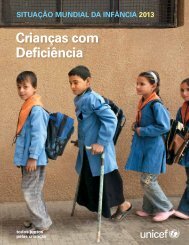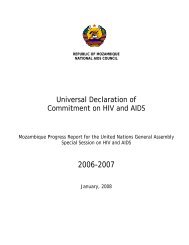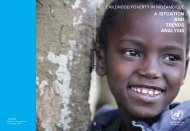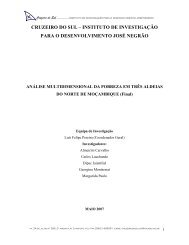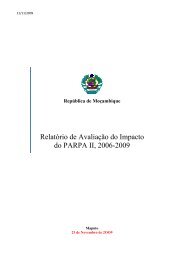Mozambican Civil Society Within: - UNICEF Mozambique - Home page
Mozambican Civil Society Within: - UNICEF Mozambique - Home page
Mozambican Civil Society Within: - UNICEF Mozambique - Home page
You also want an ePaper? Increase the reach of your titles
YUMPU automatically turns print PDFs into web optimized ePapers that Google loves.
<strong>Mozambican</strong> <strong>Civil</strong> <strong>Society</strong> <strong>Within</strong>: Evaluation, Challenges, Opportunities and Action<br />
As regards impact, the variables with above-average scores were those related with social<br />
policies, lobbying for better state services and meeting societal needs.<br />
Other variables also have a satisfactory level, with a score around the average between zero<br />
and three and can be found in the matrix in Annex 4.<br />
Main Weaknesses of the <strong>Mozambican</strong> <strong>Civil</strong> <strong>Society</strong>, 2007<br />
The scores presented in Annex 4 also show the weak or very weak areas. Of the 21 Structure<br />
variables, 5 received a score of zero: 1.1.3) percentage of people belonging to CSOs; 1.2.3)<br />
percentage of people belonging to more than one CSO; 1.4.1) percentage of CSOs in federations<br />
or networks; 1.4.4) level of support infrastructure for civil society; 1.4.5) proportion of CSOs<br />
with international linkages.<br />
As regards the Environment, 2 of the 26 variables had a score of zero, meaning very serious:<br />
2.1.4) corruption in the public sector; 2.6.3) state support in the form of resources for civil<br />
society. As regards Values, two of the 17 variables had a zero score: 3.5.2) effective gender<br />
equity practices in civil society; 3.8.3) actions to promote diversity in civil society. As regards<br />
Impact, 2 of the 16 variables had a zero score: 4.2.2) capacity of CSOs to hold corporations<br />
accountable; 4.5.3) effective response to the immediate needs of marginalised groups.<br />
Obviously, some scores might not be readily comprehensible without reading the explanation<br />
for the score. Some appear counter intuitive and surprising. The explanations will have to be<br />
consulted and the methodology’s criteria matrix taken into account. As regards the other areas<br />
with scores above zero but below average, Annex 4 and the following text provide numerical<br />
details and explanations.<br />
In order to use the CSI evaluation to produce guidelines and future actions, between 4 and 6<br />
December 2007 there was a national workshop attended by 250 participants. In addition, in<br />
January and February the technical team had some smaller technical meetings to analyse the<br />
results of the study and identify the main recommendations.<br />
General recommendations<br />
The CSO study’s general recommendations arising from group discussions during the national<br />
workshop can be summarized in five main points:<br />
1. The representatives of <strong>Mozambican</strong> civil society present in the workshop recognized<br />
the need to establish a code of conduct that enables it to promote democracy and<br />
transparency in its actions.<br />
<strong>Civil</strong> <strong>Society</strong> Index, <strong>Mozambique</strong> 2007<br />
xxxi


